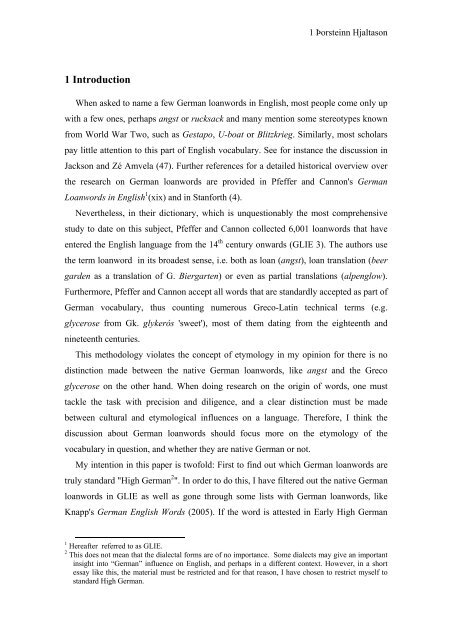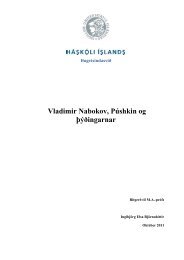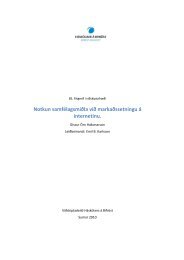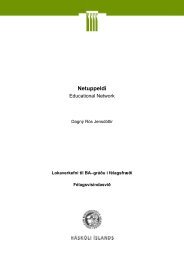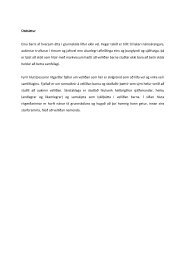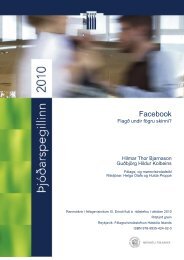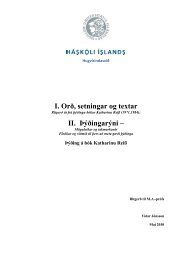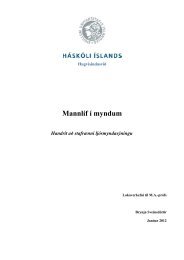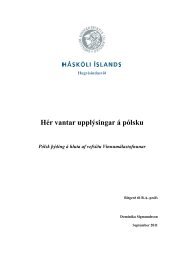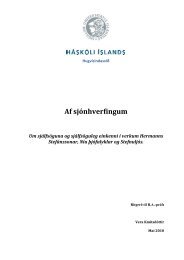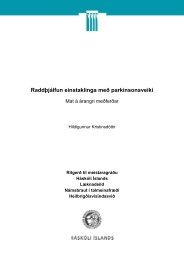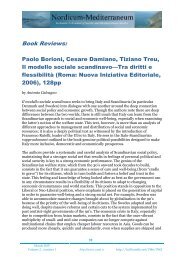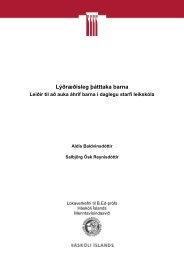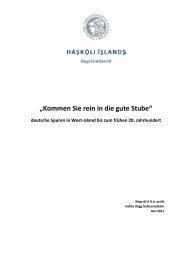Capturing the Zeitgeist Native German Loanwords in ... - Skemman
Capturing the Zeitgeist Native German Loanwords in ... - Skemman
Capturing the Zeitgeist Native German Loanwords in ... - Skemman
Create successful ePaper yourself
Turn your PDF publications into a flip-book with our unique Google optimized e-Paper software.
1 Introduction<br />
1 Þorste<strong>in</strong>n Hjaltason<br />
When asked to name a few <strong>German</strong> loanwords <strong>in</strong> English, most people come only up<br />
with a few ones, perhaps angst or rucksack and many mention some stereotypes known<br />
from World War Two, such as Gestapo, U-boat or Blitzkrieg. Similarly, most scholars<br />
pay little attention to this part of English vocabulary. See for <strong>in</strong>stance <strong>the</strong> discussion <strong>in</strong><br />
Jackson and Zé Amvela (47). Fur<strong>the</strong>r references for a detailed historical overview over<br />
<strong>the</strong> research on <strong>German</strong> loanwords are provided <strong>in</strong> Pfeffer and Cannon's <strong>German</strong><br />
<strong>Loanwords</strong> <strong>in</strong> English 1 (xix) and <strong>in</strong> Stanforth (4).<br />
Never<strong>the</strong>less, <strong>in</strong> <strong>the</strong>ir dictionary, which is unquestionably <strong>the</strong> most comprehensive<br />
study to date on this subject, Pfeffer and Cannon collected 6,001 loanwords that have<br />
entered <strong>the</strong> English language from <strong>the</strong> 14 th century onwards (GLIE 3). The authors use<br />
<strong>the</strong> term loanword <strong>in</strong> its broadest sense, i.e. both as loan (angst), loan translation (beer<br />
garden as a translation of G. Biergarten) or even as partial translations (alpenglow).<br />
Fur<strong>the</strong>rmore, Pfeffer and Cannon accept all words that are standardly accepted as part of<br />
<strong>German</strong> vocabulary, thus count<strong>in</strong>g numerous Greco-Lat<strong>in</strong> technical terms (e.g.<br />
glycerose from Gk. glykerós 'sweet'), most of <strong>the</strong>m dat<strong>in</strong>g from <strong>the</strong> eighteenth and<br />
n<strong>in</strong>eteenth centuries.<br />
This methodology violates <strong>the</strong> concept of etymology <strong>in</strong> my op<strong>in</strong>ion for <strong>the</strong>re is no<br />
dist<strong>in</strong>ction made between <strong>the</strong> native <strong>German</strong> loanwords, like angst and <strong>the</strong> Greco<br />
glycerose on <strong>the</strong> o<strong>the</strong>r hand. When do<strong>in</strong>g research on <strong>the</strong> orig<strong>in</strong> of words, one must<br />
tackle <strong>the</strong> task with precision and diligence, and a clear dist<strong>in</strong>ction must be made<br />
between cultural and etymological <strong>in</strong>fluences on a language. Therefore, I th<strong>in</strong>k <strong>the</strong><br />
discussion about <strong>German</strong> loanwords should focus more on <strong>the</strong> etymology of <strong>the</strong><br />
vocabulary <strong>in</strong> question, and whe<strong>the</strong>r <strong>the</strong>y are native <strong>German</strong> or not.<br />
My <strong>in</strong>tention <strong>in</strong> this paper is twofold: First to f<strong>in</strong>d out which <strong>German</strong> loanwords are<br />
truly standard "High <strong>German</strong> 2 ". In order to do this, I have filtered out <strong>the</strong> native <strong>German</strong><br />
loanwords <strong>in</strong> GLIE as well as gone through some lists with <strong>German</strong> loanwords, like<br />
Knapp's <strong>German</strong> English Words (2005). If <strong>the</strong> word is attested <strong>in</strong> Early High <strong>German</strong><br />
1 Hereafter referred to as GLIE.<br />
2 This does not mean that <strong>the</strong> dialectal forms are of no importance. Some dialects may give an important<br />
<strong>in</strong>sight <strong>in</strong>to “<strong>German</strong>” <strong>in</strong>fluence on English, and perhaps <strong>in</strong> a different context. However, <strong>in</strong> a short<br />
essay like this, <strong>the</strong> material must be restricted and for that reason, I have chosen to restrict myself to<br />
standard High <strong>German</strong>.


